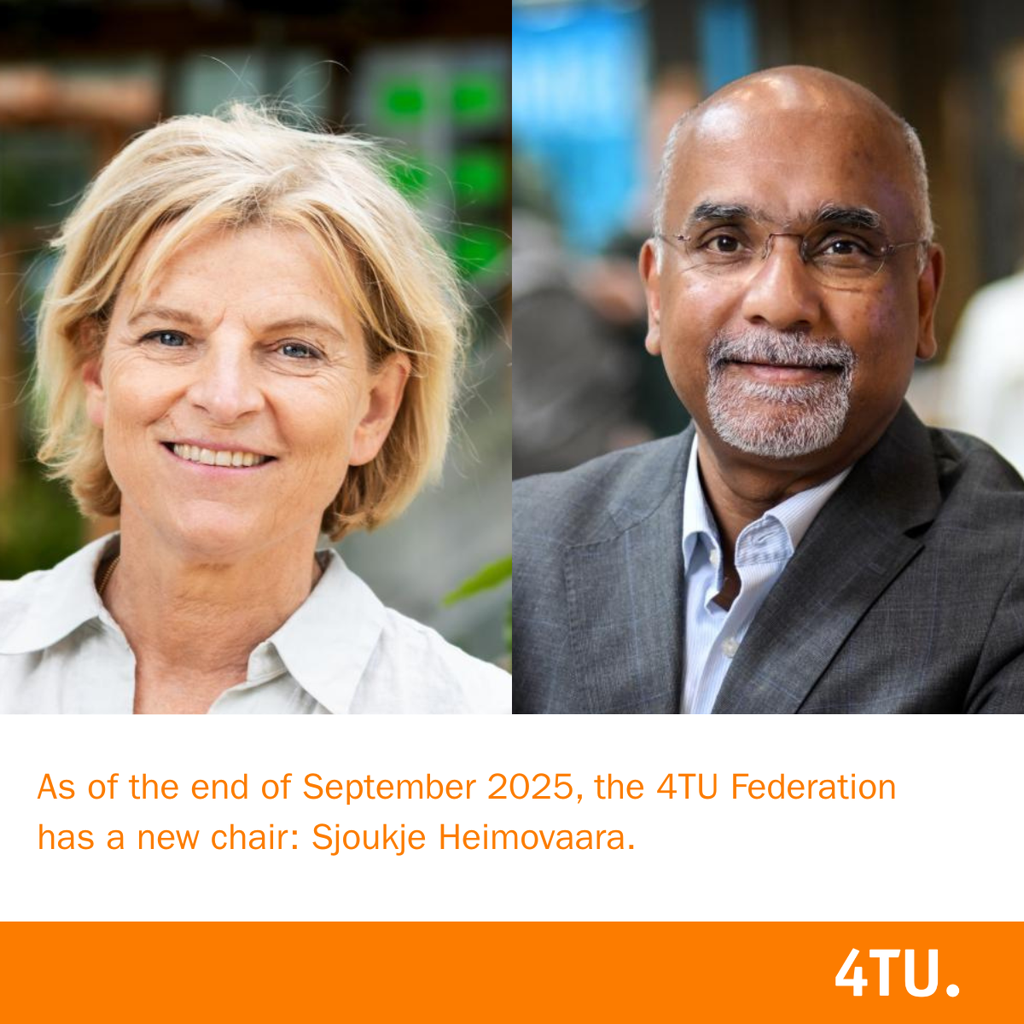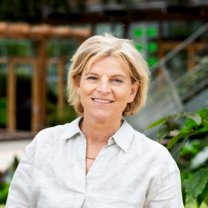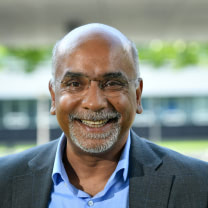As of the end of September 2025, the 4TU Federation has a new chair: Sjoukje Heimovaara. She took over this role from Vinod Subramaniam, who held the position for three and a half years. “The only real resource the Netherlands has is knowledge.”
It sounds a bit like a trading exercise. Sjoukje Heimovaara just left her board position at Universities of the Netherlands, the partnership between the fourteen Dutch universities. Vinod Subramaniam recently took over that role. And conversely, Sjoukje just became chair of the 4TU Federation, the position Vinod held until recently. But the swap is a natural one, as both of them emphasise. “Collaboration between universities is incredibly important and, above all, a lot of fun,” says Sjoukje, “but it does take time, so we tend to divide the responsibilities a bit.”
The incoming and outgoing 4TU chairs will both continue to lead their own universities: Sjoukje in Wageningen, Vinod in Twente. We sat down to talk immediately after the 4TU board meeting in which the chair was transferred, at the end of September 2025.
You’re both not new to 4TU, as you’ve been board members for a few years now. How do you look back on the past few years at 4TU?
Have you been successful, in this regard?
Vinod: “I do think so, yes. We’ve set up several very successful programmes, including High-Tech for a Sustainable Future (HTSF), which focuses on high-tech solutions for the major challenges in health, materials, energy, climate change resilience... We’re really making a dent there. I love how you say that in Dutch: to make a dent in a pack of butter...”
Sjoukje: “Haha, I agree. And yes, I’m also impressed by HTSF. Precisely because you can’t solve these large, complex issues with technology alone. At our four universities, we do have expertise in the transfer to applications, also in collaboration with businesses and behavioural sciences, for instance. All of which are essential for the major transitions.”
Are concrete projects 4TU’s greatest achievement, or is it also its growing political impact?
Sjoukje: “Both. Absolutely. Politicians are increasingly realising the importance of technical talent and interdisciplinary work. And that’s partly because we’re able to bring these topics into the spotlight. We’re increasingly successful in building bridges between the four universities and other colleagues. Wonderful connections and new insights are emerging – and those are becoming increasingly visible.”
Vinod: “Take resilience, for instance, as a new field of expertise. Resilience in the context of the major challenges of our time. This concept is becoming increasingly accepted. It requires civil engineers, but also IT specialists, and political, social and behavioural scientists... we have all of those, spread across the four universities of technology. And we’re now exporting their knowledge worldwide.”
Vinod will remain a member of the 4TU board. What will the Board focus on in the coming years?
Sjoukje: “The same themes will remain important, the same twelve networks that we’re working on. Those major challenges, after all, don’t change that quickly. They’re a long-term commitment. Perhaps we’ll strengthen or emphasise some of them a bit more. Resilience, for example. There’s still a lot to discover and develop in that area.”
Vinod: “I see many opportunities, especially when it comes to connecting the different scales. Having an impact locally and regionally, but also globally. Our universities have traditionally excelled at that.”
We’ll soon have a new Cabinet. What are your hopes?
Sjoukje: “For a while, we’ve had a rather bleak political landscape, regarding science. We certainly hope the tide will turn again – that the government will make sure that 3 percent of GDP, rather than the current 1 percent, is invested in R&D, as agreed Europe-wide. This is crucial if we want to persuade companies to up their investments, if we want to maintain our reputation as a knowledge-based nation – and if we want to continue attracting young talent.”
Vinod: “The only real resource the Netherlands has is knowledge.”
Sjoukje: “There’s already slightly more reference to science in the political manifestos. And in the previous coalition agreement, the word ‘innovation’ was mentioned more than eighty times. But still, funds have only decreased. What’s hopeful, at least, is that Dutch businesses are very eager for change, so the pressure from the Confederation of Netherlands Industry and Employers (VNO-NCW) and the SME sector is also increasing. I think the political parties, from left to right, will be sensitive to that.”
Vinod: “Yes, we’re increasingly seeing lobbying by these umbrella organisations in The Hague: if we want to solve these major societal issues, we’ll have to invest in R&D and the associated student training programmes. As 4TU, we have a very clear responsibility in this regard. That’s our societal role. And I think we’re already quite good at it.”
So you’re both optimistic, in this regard?
Sjoukje: “Absolutely. Within Dutch universities, we are very well positioned to tackle all the major challenges – as long as we work together. And as 4TU, we play a special role in this. This is especially true when it comes to emphasising that investments in education and research always more than pay for themselves. No country has ever been worse off for investing in young talent.”
Vinod: “And in knowledge development.”
Sjoukje: “Exactly. And I think 4TU is really good at that – at making this visible, through real, concrete impact.”
Vinod: “And when we say ‘4TU,’ we don’t mean ourselves, as Board members. We mean all those people who conduct research and shape education, and the students, and the Bureau... All fantastic and passionate people. We are truly blessed with all of them. That certainly deserves to be said.”
photo Sjoukje Heimovaara: Marit Hazebroek


